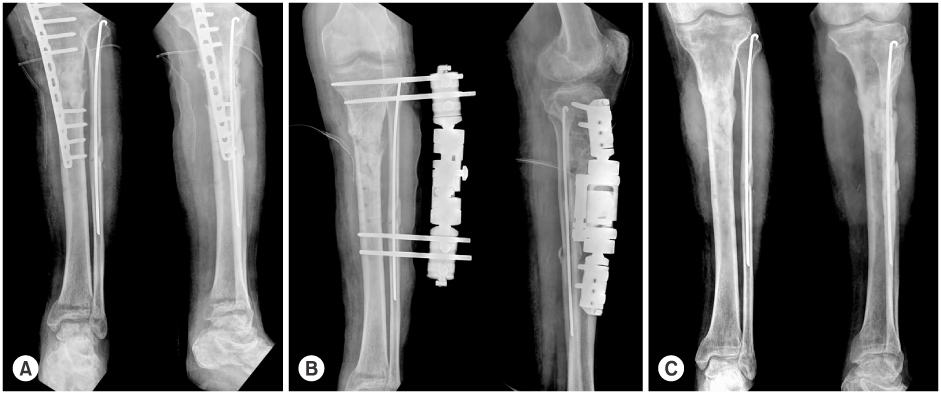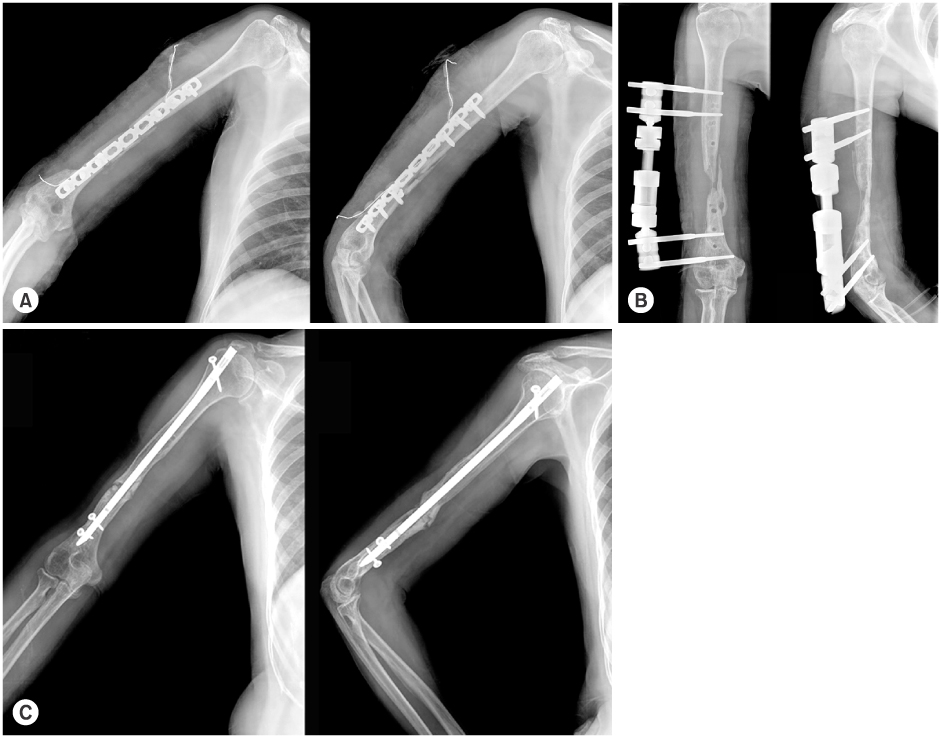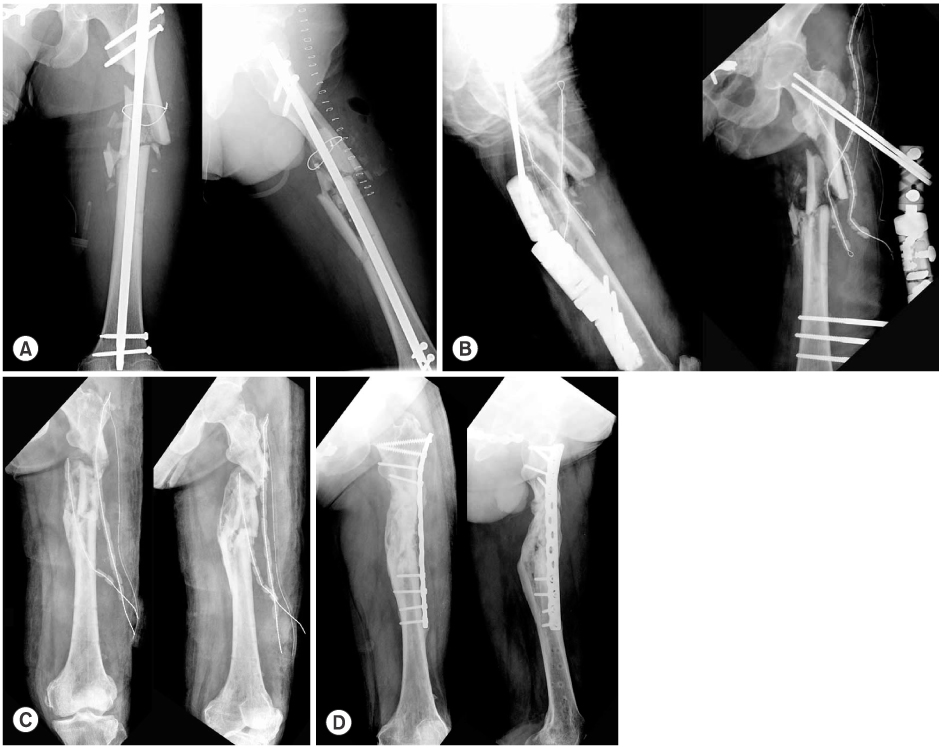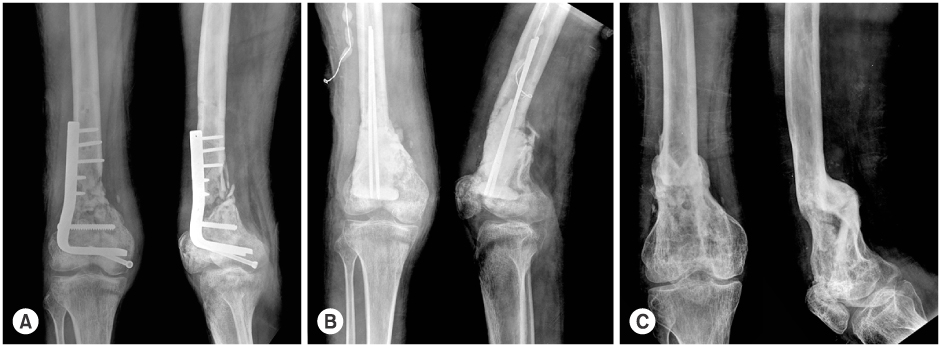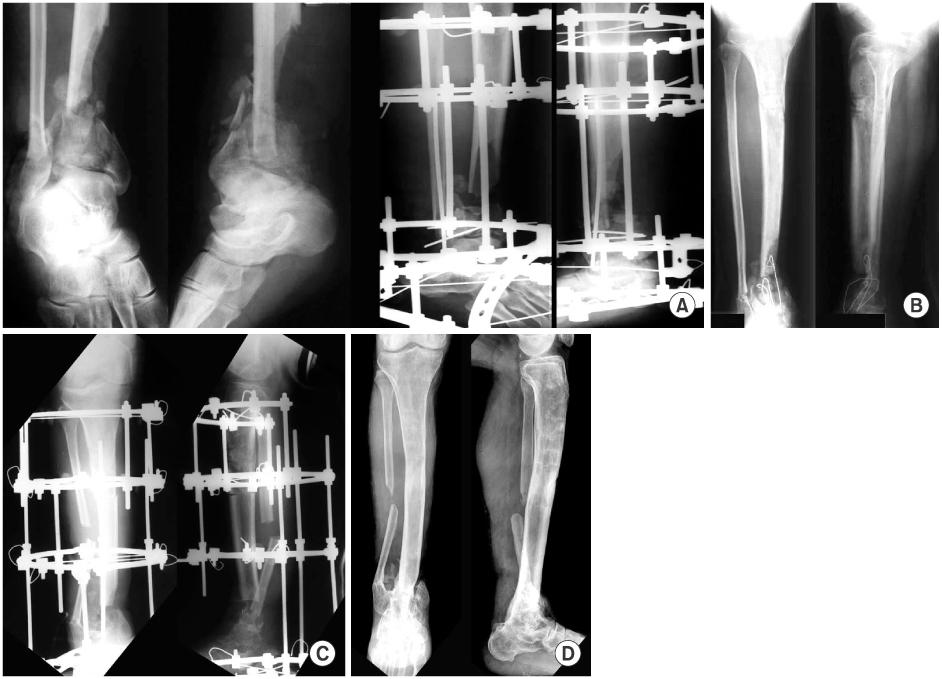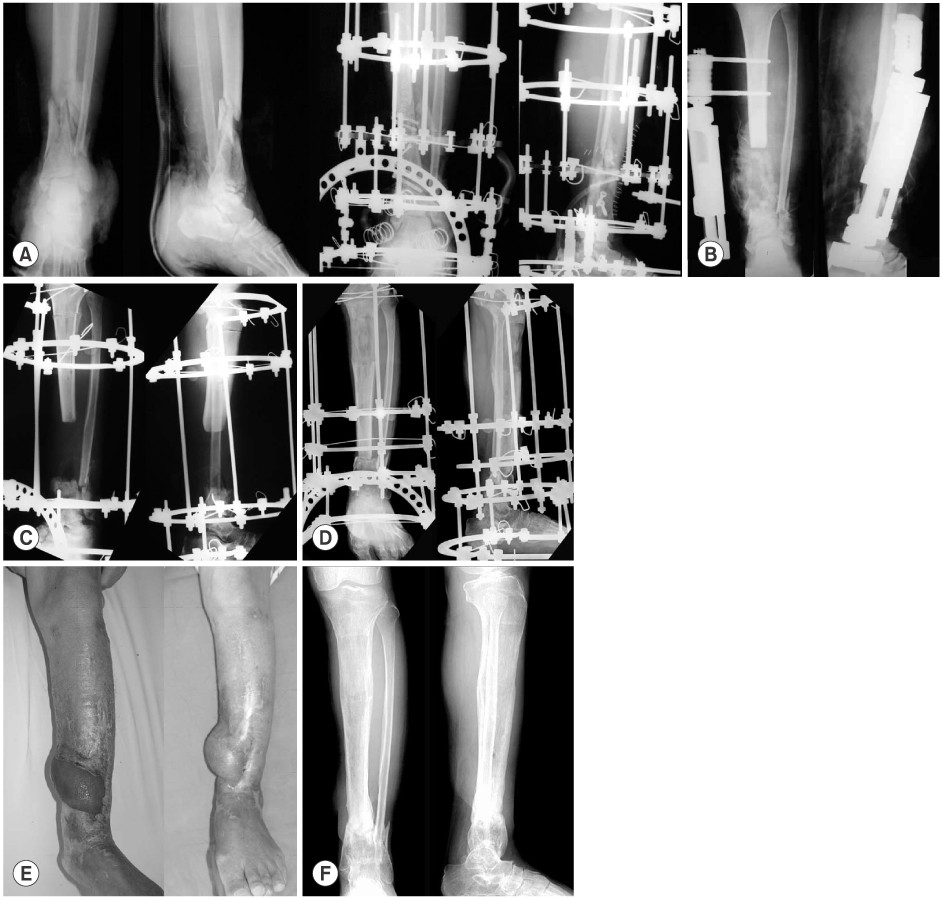J Korean Fract Soc.
2007 Apr;20(2):206-214. 10.12671/jkfs.2007.20.2.206.
Treatment of Infected Nonunion
- Affiliations
-
- 1Department of Orthopedic Surgery, Chosun University Hospital, 588, Seosuk-dong, Dong-gu, Gwangju 501-717, Korea. shha@chosun.ac.kr
- KMID: 2295582
- DOI: http://doi.org/10.12671/jkfs.2007.20.2.206
Abstract
- No abstract available.
Figure
Cited by 1 articles
-
Treatment Strategy of Infected Nonunion
Hyoung-Keun Oh
J Korean Fract Soc. 2017;30(1):52-62. doi: 10.12671/jkfs.2017.30.1.52.
Reference
-
1. Babhulkar S, Pande K, Babhulkar S. Nonunion of the diaphysis of long bone. Clin Orthop Relat Res. 2005; 431:50–56.2. Brinker MR, O'Connor DP. Exchange nailing of ununited fractures. J Bone Joint Surg Am. 2007; 89:177–188.
Article3. Browner BD, Jupiter JB, Levine AM, Trafton PG. Skeletal trauma. 3rd ed. Philadelphia: Saunders;2003. p. 532–535.4. Cabanela ME. Open cancellous bone grafting of infected bone defects. Orthop Clin North Am. 1984; 15:427–440.
Article5. Chen CE, KO JY, Pan CC. Results of vancomycin-impregnated cancellous bone grafting for infected tibial nonunion. Arch Orthop Trauma Surg. 2005; 125:369–375.
Article6. Cho SH, Jeong ST, Park HB, Hwang SC, Ha YC, Hwang IH. Two-stage reconstruction of infected nonunion of long bones using antibiotics- impregnated cement beads. J Korean Fract Soc. 2004; 17:395–400.
Article7. Green SA, Dlabal TA. The open bone graft for septic nonunion. Clin Orthop Relat Res. 1983; 180:117–124.
Article8. Green SA, Jackson JM, Wall DM, Marinow H, Ishkanian J. Management of segmental defects by the llizarov intercalary bone transport method. Clin Orthop Relat Res. 1992; 280:136–142.9. Han DY, Lee HM, Lee SB. A clinical analysis of the treatment of infected non-union in the fractures of long bones. J Korean Orthop Assoc. 1990; 25:389–397.
Article10. Han SK, Choi NY, Park SJ, Lee SK, Jang G, Lee IJ. Antibiotic cement-coated unreamed nailing for treatment of infected nonunion of long bone. J Korean Orthop Assoc. 2000; 35:699–703.
Article11. Holtom PD, Patzakis MJ. Newer methods of antimicrobial delivery for bone and joint infections. Instr Course Lect. 2003; 52:745–749.12. Jain AK, Sinha S. Infected nonunion of the long bones. Clin Orthop Relat Res. 2005; 431:57–65.
Article13. Klemm KW. Antibiotic bead chains. Clin Orthop Relat Res. 1993; 295:63–76.
Article14. Krishnan A, Pamecha C, Patwa JJ. Modified llizarov technique for infected nonunion of the femur: the principle of distraction-compression osteogenesis. J Orthop Surg (Hong Kong). 2006; 14:265–272.
Article15. Mader JT, Landon GC, Calhoun J. Antimicrobial treatment of osteomyelitis. Clin Orthop Relat Res. 1993; 295:87–95.
Article16. Marsh JL, Prokuski L, Biermann S. Chronic infected tibial nonunion with bone loss: conventaional techniques versus bone transport. Clin Orthop Relat Res. 1994; (301):139–146.17. May JW Jr, Jupiter JB, Weiland AJ, Byrd HS. Current concepts review: clinical classification of post-traumatic tibial osteomyelitis. J Bone Joint Surg Am. 1989; 71:1422–1428.18. Meyer S, Weiland AJ, Willenegger H. The treatment of infected non-union of fractures of long bones. Study of sixty-four cases with a five to twenty-one-year follow-up. J Bone Joint Surg Am. 1975; 57:836–842.
Article19. Miller ME, Ada JR, Webb LX. Treatment of infected no nunion and delayed union of tibia fractures with locking intramedullary nails. Clin Orthop Relat Res. 1989; (245):233–238.20. Park MS, Lee KO. The treatment of infected non-union of fractures of long bones. J Korean Orthop Assoc. 1985; 20:689–699.
Article21. Park SJ, Shim JS, Shin SK. Treatment for intractable infected nonunion of lower extremity in elderly people using external fixator. J Korean Fract Soc. 2004; 17:177–183.
Article22. Patzakis MJ, Scilaris TA, Chon J, Holtom P, Sherman R. Results of bone grafting for infected tibial nonunion. Clin Orthop Relat Res. 1995; 315:192–198.
Article23. Ruedi TP, Murphy WM. AO principles of fracture management. 1st ed. New York: Theime;2000. p. 785–800.24. Toh CL, Jupiter JB. The infected nonunion of the tibia. Clin Orthop Relat Res. 1995; (315):176–191.
Article25. Ueng SW, Wei FC, Shin CH. Management of femoral diaphyseal infected nonunion with antibiotic beads local therapy, external skeletal fixation, and staged bone grafting. J Trauma. 1999; 46:97–103.
Article26. Wahlig H, Dingeldein E, Bergmann R, Reuss K. The release of gentamicin from polymethylmethacrylate beads. An experimental and pharmacokinetic study. J Bone Joint Surg Br. 1978; 60-B:270–275.
Article27. Weiland AJ. Current concepts review: vascularized free bone transplants. J Bone Joint Surg Am. 1981; 63:166–169.
- Full Text Links
- Actions
-
Cited
- CITED
-
- Close
- Share
- Similar articles
-
- Infected Nonunion of Clavicle Shaft after Operation: A Case Report
- Treatment of Infected Nonunion of the Femur with Marked Shortening by Compression and Gradual Distraction at the Nonunion Site: A Report of 2 cases
- Etiology and Management of Nonunion
- The Treatment of Infected Nonunion by the Ilizarov Technique
- Treatment Strategy of Infected Nonunion

